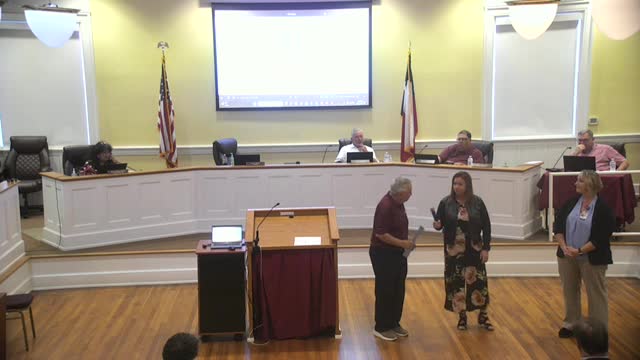Lockhart council votes 6-1 not to adopt Flock Safety license-plate reader system after public privacy concerns
Get AI-powered insights, summaries, and transcripts
Subscribe
Summary
After a staff presentation and extensive public comment on privacy, data access and costs, the Lockhart City Council voted 6-1 to decline a proposed law enforcement agreement with Flock Group Inc. for fixed automated license plate reader cameras.
The Lockhart City Council voted 6-1 not to move forward with a proposed law enforcement agreement with Flock Group Inc. for fixed automated license plate reader (LPR) cameras, following a presentation by police staff and two Flock representatives and more than an hour of public comment and council questions.
Council members heard the Lockhart Police Department describe the system as a public-safety tool and were shown company presentations about how the cameras operate, what data they capture and the vendor’s retention and auditing features. Police Chief Gary Williamson said the department views the technology as an aid in investigating crimes such as burglary of motor vehicles and described the system as “a force multiplier” for an understaffed department.
The decision matters because the proposal would have placed seven fixed cameras at city ingress and egress points, with an initial 12‑month subscription and automatic annual renewals at $21,000 a year. The vendor and police described the system as retaining images for 30 days, integrating with national law-enforcement databases and producing real-time alerts for vehicles on a hot list.
Chief Williamson, Lockhart Police Department, told the council the cameras would assist in identifying stolen vehicles and wanted persons: “One of our main crimes in town since I got here is burglary of motor vehicles,” he said. “We see these cameras, which would be operating 24/7, as a force multiplier.”
Brandon Williams, a Flock Safety representative, framed the presentation around privacy and community values: “My hope by the end of the presentation is that it’s very clear on how the technology works, what the intended use cases are and aren’t, what kind of data is being captured and not being captured, as well as how the data is shared, who it’s shared with, and who it’s not shared with.”
Trevor Chandler, Flock’s director of public affairs, emphasized the company’s security and deletion policies and the vendor’s position on ownership of images: “Flock does not sell data, period. No federal agencies will have access to your data unless your community chooses to share it with them,” Chandler said. He also described the vendor’s 30‑day automatic deletion policy and its audit logs.
But many residents who addressed council urged caution or rejection, citing privacy, data‑sharing and misuse risks. Amy Camp, communications director for Ground Game Texas, read a prepared statement from a Lockhart resident and cited recent reversals or pauses on LPR deployments in other cities: “If larger cities with deep resources are stepping back, that should give a small community like ours pause,” she said.
Other public commenters raised examples of misuse, erroneous stops, and possible cross-jurisdictional sharing that could result in immigration or reproductive-health lookups. Jessica Rutland, a Lockhart resident, said the community should not “sacrifice liberty for safety.” Bob Cole, a resident with a background in public safety, spoke in favor, noting potential benefits for Amber Alerts and missing-person cases.
Council discussion focused on where cameras would be placed (main thoroughfares and city entrances), what data the system stores (still images of vehicles and plates, vehicle descriptors), who would own and control data access (the Lockhart Police Department under a draft departmental policy), and the legal risk that data could be preserved under subpoena. Flock representatives said their system does not include DMV linkage or personally identifiable records inside the vendor platform and that images are stored on AWS GovCloud with CJIS-level protections.
Council members and members of the public repeatedly asked whether the city could prevent future sharing decisions from changing, and how the city would guarantee that federal or other agencies could not obtain the data. Flock representatives said sharing is a local decision and that subpoenas can compel preservation of images that otherwise would delete after 30 days. Chandler said, “If Flock receives a subpoena for an image that your cameras have collected, we are contractually obligated to redirect that subpoena request to you.”
After public comment and council questions, a motion “not to move forward with the Flock cameras” carried on a 6‑1 vote in the regular session. The council did not authorize the city manager to execute the agreement; staff had previously recommended approval and authorization to execute necessary documents.
The council’s vote means Lockhart will not proceed with the seven-camera subscription proposal at this time. City staff noted the item could be revisited in the future, and the record shows staff also considered scheduling an in‑person vendor presentation if the council wanted more information.
The meeting record includes a large volume of public comment and detailed vendor claims about retention policies, audit logs, encryption standards and optional search filters for immigration and reproductive-health related searches. The council’s final action reflects a majority conclusion, after weighing those claims against resident concerns about privacy, data sharing and legal exposure.
